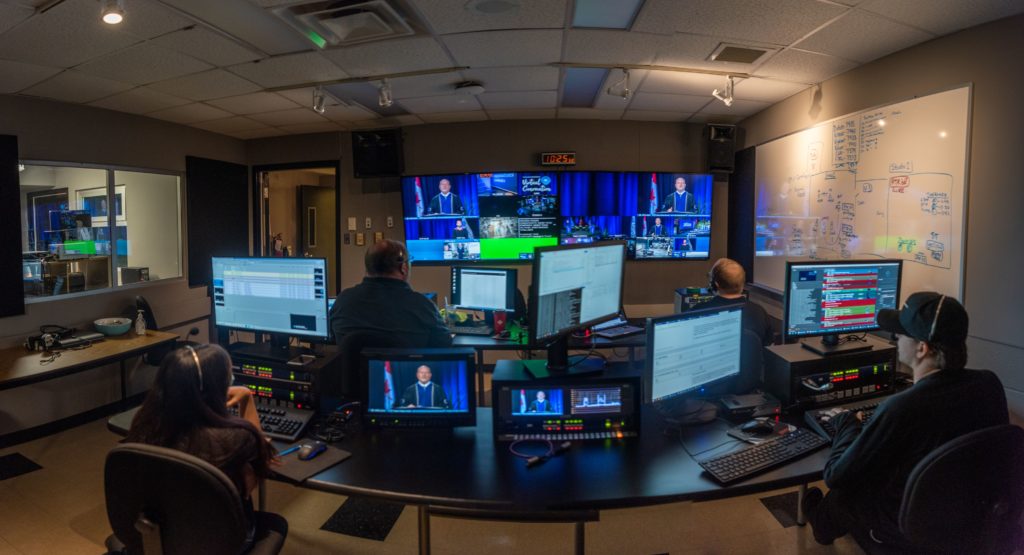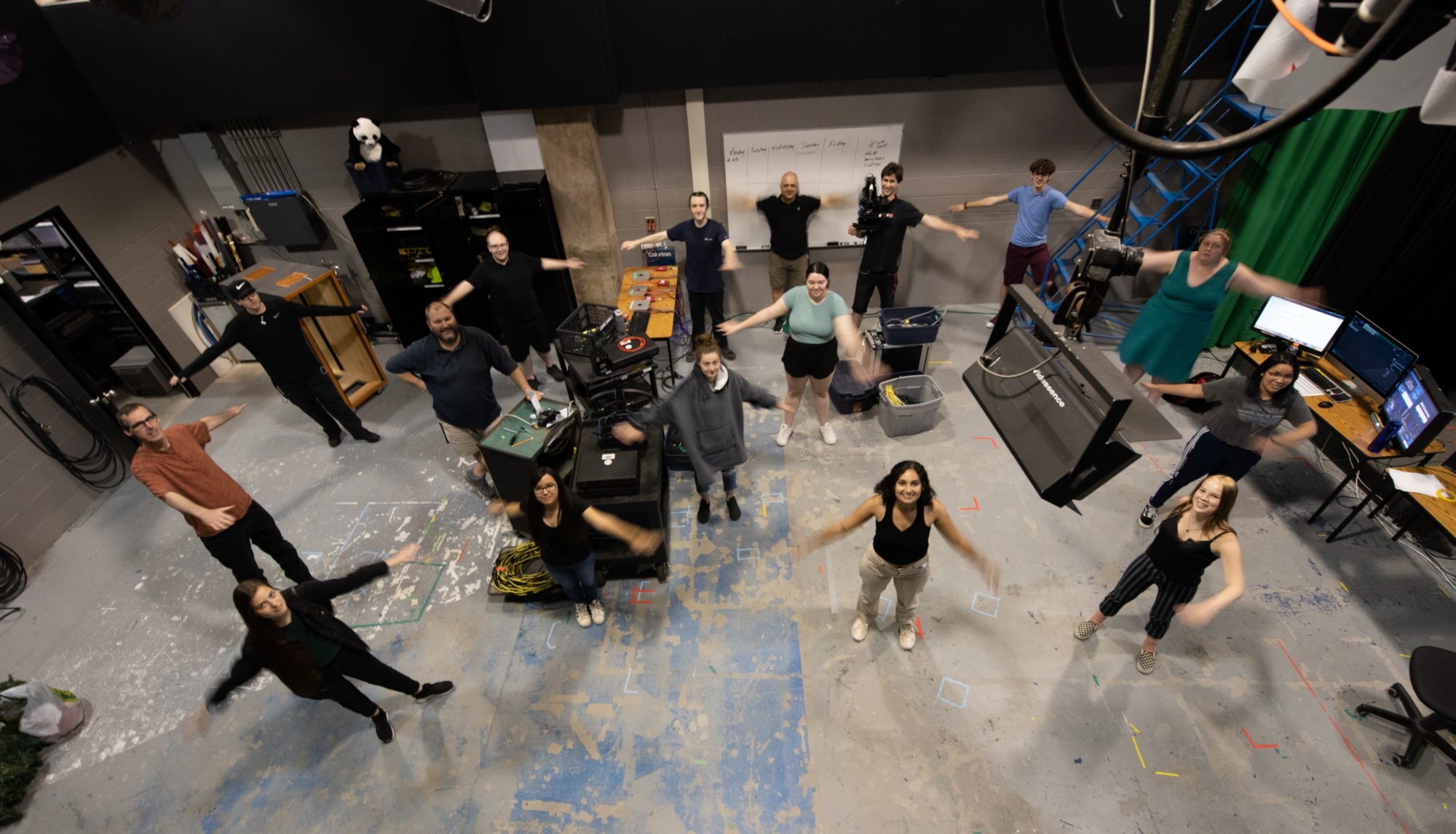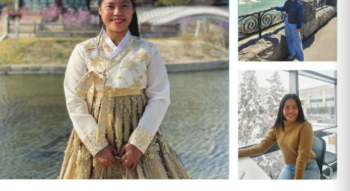For thousands of new graduates, Spring Convocation marked the end of their educational journey, but for a group of students in the Broadcasting- Radio, Television and Film program, it sparked the beginning of a new learning opportunity.
A group of 10 Broadcasting students worked behind the scenes alongside faculty and College staff to help bring NC’s first-ever Virtual Convocation – which celebrated more than 5,300 new graduates through a series of livestreamed ceremonies June 15-19 – to tens of thousands of viewers in Niagara, across Canada and around the world.
“Our students got to participate in making history,” said BRTF program coordinator Peter VandenBerg, who played a key role on the event planning committee and led the event production and livestream from the College’s Welland Campus June 15-19. “We’ve never done something like this before. They brought their best efforts and applied their skills in a new environment and they all rocked it.”
For the students, it was a paid opportunity to apply what they have learned in the program and enhance their skills.
Broadcasting studios at the Welland Campus became a hub of physically-distanced activity during the ceremonies. While VandenBerg produced each ceremony ‘show,’ students took on various roles as directors, graphics, audio mixers and editors, teleprompter operators, camera and floor managers and more. Faculty also worked on the production, including Dave Lostracco, and recent grad and Acting TA Sebastian Voth working the jib camera, and BRTF engineer Byron Gracey assisting with tech issues and streaming logistics.
The main convocation area was set up in the College’s Film Studio – complete with flags, lighting, podiums and flowers as ceremonies are traditionally staged. The Studio 2 control room transformed into the convocation production hub. Every signal was routed back to the control room so feeds could be monitored. Each ceremony was livestreamed to the College website and Facebook Live.
Over in the ‘Zoom room’, Marketing staff member Luke Gillett oversaw the ceremony Zoom parties, which enable graduates to congregate and celebrate together. Moments from the Zoom parties were incorporated into the live ceremonies, offering viewers a glimpse of the cheering grads. Four students who assisted as ‘Zoom techs’ loaded and organized the sessions and incorporated them into the show.
A Zoom station was also set up so that College president Sean Kennedy and senior VP Academic Steve Hudson could participate interact with the graduates throughout the ceremonies.
Hamilton resident Olivia Fortune-Pfeiffer, poised to enter her second year of Broadcasting this fall, was responsible for working the teleprompter during the ceremonies.
“It was the first live, professional broadcast I’ve been able to participate in,” she said. “The sheer numbers of people tuning in every day made it so real for me and so exciting.”
Preparations began well before the five days of ceremonies as BRTF and College Marketing staff prepared numerous pre-recorded video segments to be implemented into the ceremonies, including those featuring the NC Student Administrative Council, the Board of Governors, an Indigenous welcome, the singing of O Canada (by faculty members Barbara Mantini, Giacomo Folinazzo and Paul Wintemute), an opening video geared to the Class of 2020, and more.
Name readings were pre-recorded for each of the 5,300 new graduates being honoured during the week of ceremonies. In the radio studios, BRTF students assisted BRTF faculty Bruce Gilbert and Chris Jeanneret with pre-recording the names of all 5,300 new graduates to be incorporated into the ceremonies. Names were read by Carolyn Ambrose-Miller and Frank Bieri.
St. Catharines resident James Wilson, who will begin his third year of the Broadcasting program in September, played a key role in preparing for the event. Wilson developed a time-saving system to bring up student names with their programs, which was used to record the name readings during each ceremony. He also assisted with setting up equipment and staging for the live set. During the livestream ceremonies, Wilson produced and ran the video playback for pre-recorded content.
“After our semester ending early due to COVID-19, I wanted the chance to work on more productions so I wouldn’t have as big of time off before the third year,” he said. “I also wanted to help the school put on a production no other College was doing.”
Wilson valued the opportunity to learn more about the setup for this type of production – compared to sports productions that he had previous experience with – as well as in video playback which he had not done before at this level.
“I enjoyed the experience and although we had some issues during production, I feel we provided the grads with a respectful convocation in light of the in-person ceremonies not being able to take place,” he said.
For VandenBerg, Virtual Convocation proved to be a “test of what was possible” in the new landscape of COVID-19. He noted that each ceremony was organic in this complex production, which included several volatile elements with hundreds of different variables. Due to the unique style of production and restrictions in place, VandenBerg pointed out how they had to adapt to a smaller crew size while delivering the results typically expected of a crew twice the size. As a result, many took on ‘double duty’ roles.
“In the control room, we normally have seven to eight, and for this, we had four crew,” he said. “In total, this style of production would require about 20 crew and we had half that.”
Despite the challenges, it proved to be a meaningful experience for students such as Fortune-Pfeiffer, who recently selected the TV stream of the Broadcasting program. She appreciated the opportunity to get her foot in the door and work alongside several third-year students as well as profs with industry experience.
“To watch how everyone pulled together this production in such a professional, driven manner was so inspiring and really confirmed to me that TV is exactly what I want to go into,” she said.

She noted that it was an honour to be involved with the events, as efforts were channelled into ensuring that graduates from the Class of 2020 were able to celebrate their milestone day in a memorable way.
“There were so many moving parts of this project. Everyone put their heart and soul into it before I came in,” she said. “I can’t wait to see what’s in store for the next graduating class and how this event will change the way we celebrate in the future.”
Broadcasting participants on the crew included Abby Vladianu, Annie Livingstone, Byron Gracey, Charlie Short, Dave Lostracco, James Wilson, Lexi Barclay, Matthew Schaefer, Megan Williamson, Nick Hatlevik, Olivia Fortune Pfeiffer, Parween Taheri, Sabrina Croteau, Sarah Cedeno, and Sebastian Voth.
Virtual convocation brings the pomp despite the circumstance to celebrate NC’s Class of 2020



